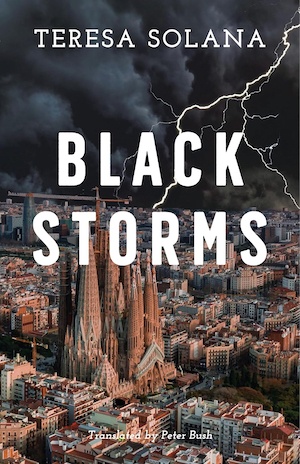
Translated by Peter Bush — Teresa Solana’s Black Storms is a compelling work of crime fiction with a strong historical basis that brims with both contemporary and period detail, quirky humour and intricate character dynamics. Set in the vibrant, turbulent and unforgiving city of Barcelona in 2009, the story is a taut police procedural but also provides a meditation on Spain’s unresolved historical trauma, particularly the lingering shadows of the Civil War.
It all begins with a chillingly understated murder. Professor Francesc Parellada, a frail historian, still recovering from cancer treatment but recently returned to work, is strangled to death in his university office. The almost clinical murder takes mere seconds, much to the relief of the nameless killer through whose eyes it is witnessed. Despite his unknown rationale and rather pantomime-like disguise, the ominous reflection that he can’t risk blood splattering his clothes like the previous time makes it clear this isn’t his first rodeo.
From the outset, the crime seems bafflingly motiveless. Solana makes a bold narrative choice in immediately introducing the murderer and his warped perspective, a decision that could have drained the tension from the story but instead heightens the intrigue. The real mystery is not who committed the crime – although time is taken to put more than a name to the inner monologue – but rather why it was deemed necessary. This means that, despite the insight into the killer provided by the narrative, there is still plenty to guess at.
Deputy Inspector Norma Forester of the Catalan police is the detective tasked with finding the professor’s murderer. Given the apparent lack of suspects and evidence, it seems like a near-impossible task, albeit one that the higher-ups are adamant she must dedicate all resources to, but when a link to another recent murder emerges and the search for a motive seems to point back to the Spanish Civil War, Forester finds herself pulled into a web of secrets and betrayals that span generations.
Solana uses the historical backdrop to great effect, intertwining modern-day Barcelona’s struggles – tourism-related controversies and urban repurposing – with its haunted past. In this way, the murder investigation becomes a lens through which the unhealed scars of the Civil War are examined in both probing and light-hearted ways, revealing how the past continues to shape the present in deeply personal and often painful ways.
Forester is an engaging and refreshingly unconventional protagonist. While certainly no defective detective, she is as much defined by her chaotic personal life as by her professional role. Her family is a delightful mix of eccentric characters, including forensic pathologist husband Octavi; activist daughter Violeta, who resents the police; and Aunt Margarida, a nun and a hacker with a penchant for rebellion. These vibrant rellies frequently meddle in Forester’s investigations, offering both comic relief and unexpected insights.
Alongside the baffling nature of the case, Forester’s personal struggles – balancing her career with family demands, navigating office politics and a boss she feels is blocking her chances of advancement and dealing with her daughter’s clashes with authority – make her deeply relatable. Solana portrays her not as some sort of infallible supercop who never fails in bringing criminals to justice but as a flawed, empathetic and resourceful individual doing her best in a difficult situation, lending authenticity to the story.
In addition to the strong character development, one of the most striking aspects of Black Storms is its leisurely pacing. Unlike the detectives featured in many high-octane police procedurals, the Catalan police maintain a distinctly human approach to their work, always taking lunch breaks and respecting office hours. This slower pace doesn’t detract from the tension, instead fostering a sense of realism and allowing for deeper character exploration. The contrast between the everyday rhythms of life and the urgency of the murder investigation adds another layer to the story.
Solana also skilfully balances Black Storms’ darker themes with moments of levity. The quirky humour, much of it derived from the exploits of Forester’s unconventional family, provides a counterpoint to the weighty legacy of the Spanish Civil War and its enduring impact on Catalan society. In particular, Aunt Margarida, with her unlikely double life as a nun and a hacker, is a standout character who encapsulates the story’s ability to surprise and amuse.
At the same time, Solana certainly doesn’t shy away from exploring the deep scars left by Franco’s regime. Through certain characters’ recollections and the unearthing of long-buried secrets, she examines themes of betrayal, revenge and the intergenerational transmission of trauma. Here, the eponymous ‘black storms’ serve as a poignant metaphor for both the literal thunderstorms that loom over Barcelona as Forester’s investigation progresses and the figurative storms of unresolved grief and anger that shape characters’ lives.
Moreover, Barcelona is more than just a setting in Black Storms – it is a living, breathing entity that shapes the story. Solana’s detailed descriptions bring the city to life, from its iconic landmarks to its less-touristy corners. The juxtaposition of the city’s beauty with its historical pain mirrors the central tension between the past and the present in the story. The glimpses into Catalonia’s unique culture and political struggles, as well as the lasting impacts of the Civil War, organically add to the richness of the story, informing but never lecturing.
As the first instalment in a planned trilogy, Black Storms lays a strong foundation for future investigations led by Deputy Inspector Norma Forester. Solana’s ability to blend humour, history and mystery, as well as her ability to develop vibrant characters and describe an evocative setting, ensures that the series will appeal to crime fiction fans who are looking for something a little different, perhaps a little more human.
Click here for more crime fiction set in Spain.
Corylus Books
Print/Kindle
£3.59
CFL Rating: 5 Stars









